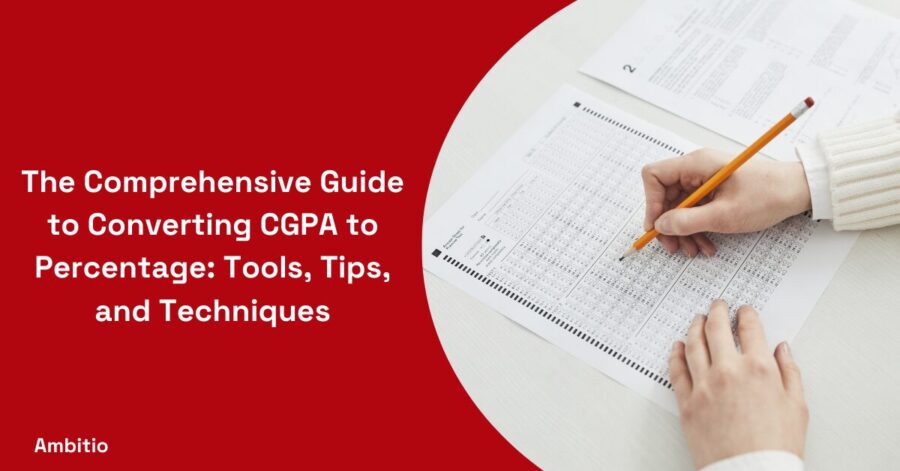13 December 2024
6 minutes read
The Comprehensive Guide to Converting CGPA to Percentage: Tools, Tips, and Techniques

Introduction
In the academic world, understanding how to convert Cumulative Grade Point Average (CGPA) into a percentage is essential for students and educators alike.
This guide delves into various methods and tools available for this conversion, with a special focus on the CBSE system and formulas used by different universities like Anna University and VTU. We aim to provide a comprehensive understanding of this conversion process, aiding in a more accurate representation of academic achievements.
Decoding CGPA to Percentage: An Essential Skill for Students
The Basics of CGPA
What is CGPA?
CGPA, or Cumulative Grade Point Average, is a widely used grading system in educational institutions. It’s an average number representing a student’s academic performance throughout their course or degree. CGPAs are often on a scale of 1 to 10, where a higher number indicates better academic performance.
Understanding CGPA in Different Educational Systems
The CGPA system varies globally. For instance, the CBSE in India uses a 10-point scale, while some universities in the United States might use a 4-point scale. This variance necessitates a clear understanding of how to interpret CGPA in the context of a specific educational system.
The Accuracy Debate: CGPA vs. Percentage
| Feature | CGPA (Cumulative Grade Point Average) | Percentage |
|---|---|---|
| Basis of Calculation | Calculated as an average of grade points obtained in all subjects. | Derived by converting the raw scores in each subject to a percentage. |
| Scale | Typically on a scale of 1 to 10 or 4.0 in some systems. | Ranges from 0% to 100%. |
| Representation | Reflects the average performance across all subjects. | Indicates the precise score obtained in each subject. |
| Accuracy | Provides a generalized view of academic performance. | Considered more precise in reflecting exact scores. |
| Advantages | – Reduces emphasis on individual subject scores. – Offers a simplified view of overall academic performance. – Widely used in continuous assessment systems. | – Detailed reflection of performance in each subject. – Familiar and universally understood. – Useful for specific academic or career requirements. |
| Limitations | – Might not capture the nuances of performance in individual subjects. – Can be less intuitive to interpret for those unfamiliar with the system. | – Can emphasize rote learning over conceptual understanding. – May lead to increased academic pressure and competition. |
| Use in Academic Progression | Often used for overall assessment in higher education and continuous assessment systems. | Preferred in systems requiring detailed subject-wise analysis, like board exams. |
| Impact on Students | – Can alleviate pressure from individual exams. – Encourages consistent performance across subjects. | – Might increase pressure to score high in each subject. – Offers a clear target for performance improvement. |
| Suitability for Conversion | – Conversion to percentage can be ambiguous. – Requires standardized formulas for accurate conversion. | – Directly interpretable, no need for conversion. – Universally accepted in its original form. |
| Preferred in | Higher education systems, universities, and professional courses. | School-level education, board exams, and some competitive exams. |
Is Converting CGPA to Percentage Always Accurate?
The debate on the accuracy of converting CGPA to percentage is ongoing. While the multiplication method provides an estimated percentage, it may oversimplify the student’s academic performance. The discrepancy arises because CGPA and percentage are fundamentally different measures of academic achievement.
Understanding the Limitations of Conversion Formulas
Each conversion formula, whether the CBSE’s multiplication method or a university-specific one, has its limitations. These formulas are designed to provide a general idea of a student’s performance but might not capture the nuances of their academic journey. This limitation is particularly evident in cases of edge grades or when considering the difficulty level of courses.
Step-by-Step Guide to Convert CGPA to Percentage
Converting your CGPA (Cumulative Grade Point Average) to a percentage can be an essential skill for students navigating through various academic and professional landscapes. Here’s a step-by-step guide to help you through the process:
Step 1: Understand Your CGPA System
- Identify Your Grading Scale: First, determine the scale on which your CGPA is calculated. For instance, the CBSE in India uses a 10-point scale, while some universities in the USA use a 4-point scale.
- Gather Your CGPA Details: Have your CGPA ready as per your academic records. This is the figure you will be converting into a percentage.
Step 2: Check for University-Specific Conversion Formulas
- Research Your Institution’s Conversion Method: If your university or board has a specific formula for converting CGPA to percentage, make sure to use that. This information can usually be found on the institution’s website or academic handbook.
- Note the Formula: Write down the exact formula or guidelines provided by your institution for accuracy.
Step 3: Use the Standard Multiplication Method (If Applicable)
- Apply the CBSE Formula (for CBSE Students): If you are under the CBSE board or your institution follows a similar method, multiply your CGPA by 9.5 to get the estimated percentage.
- Calculation: For example, if your CGPA is 8.0, the calculation would be 8.0 × 9.5 = 76%. This is your estimated percentage.
Step 4: Utilize Online CGPA to Percentage Calculators (Optional)
- Find a Reliable Online Calculator: If you prefer a quick estimate or want to double-check your manual calculations, use an online CGPA to percentage calculator.
- Input Your CGPA: Enter your CGPA into the calculator.
- Get the Result: The calculator will provide an estimated percentage based on the input CGPA.
Step 5: Consider University-Specific Online Tools (If Available)
- Search for University-Specific Calculators: Some universities offer online conversion tools that align with their specific grading systems.
- Use the Tool: Input your CGPA in the university-provided calculator for a more accurate conversion as per your institution’s guidelines.
Step 6: Cross-Verify with Manual Calculation
- Double-Check the Results: Whether you use an online calculator or a university-specific formula, it’s always good practice to cross-verify the results with a manual calculation.
- Consult Academic Advisors if Necessary: If there are discrepancies or if you’re unsure about the conversion, consult with your academic advisor or a faculty member.
Step 7: Document the Converted Percentage
- Record the Converted Percentage: Once you have your converted percentage, document it for future reference, especially if you need it for applications or resumes.
- Understand the Limitations: Remember that this conversion is an estimate and may not fully reflect the nuances of different grading systems.
Step 8: Use the Converted Percentage Appropriately
- Academic Applications: You can use this converted percentage for academic applications where a percentage score is required.
- Professional Purposes: If needed, include this percentage in your resume or job applications where specific academic scores are a criterion.
By following these steps, you can effectively convert your CGPA to a percentage, ensuring that you accurately represent your academic achievements in various contexts. Remember, the key is to understand the specific requirements of your educational system and to use the most appropriate method for conversion.
Navigating Online CGPA to Percentage Calculators
How Online Calculators Simplify the Conversion Process
The internet offers a plethora of CGPA to percentage calculators. These tools are user-friendly and only require you to input your CGPA to receive the estimated percentage. This can be particularly helpful for students who want a quick conversion without delving into the intricacies of different formulas.
Choosing the Right Calculator for Your University
While general online calculators are convenient, they might not align with the specific formulas used by certain universities. For accurate results, it’s advisable to use calculators provided by your university or those that allow customization according to your university’s specific grading system.
University-Specific Conversion Formulas
Understanding Different University Grading Systems
Universities like Anna University, VTU, and Mumbai University might have their own grading systems and conversion formulas. These institutions often provide detailed guidelines or tools for converting CGPA to percentage, tailored to their specific grading methodologies.
Case Studies: How Different Universities Approach Conversion
By examining how various universities convert CGPA to percentages, students can gain insights into the diversity of grading systems. For instance, Anna University might use a different multiplier, or VTU might incorporate additional factors like course credits and difficulty levels in its conversion formula.
The Practical Implications of CGPA to Percentage Conversion
Why is This Conversion Important?
Understanding how to convert CGPA to percentage is crucial for students, especially when applying for higher studies or jobs where the percentage is the preferred metric.
This conversion helps in standardizing academic performance across different grading systems, making it easier for institutions or employers to assess a candidate’s academic standing.
Navigating Academic and Career Opportunities with Converted Scores
A clear understanding of your percentage score, as converted from CGPA, can be instrumental in planning your academic path or career trajectory. It allows students to set realistic goals and work towards improving their scores if necessary. For instance, knowing your percentage can help in identifying areas of strength and weakness and guiding your study habits or course selections.
Tips and Tricks for Accurate CGPA to Percentage Conversion
Best Practices for a Precise Conversion
To ensure the most accurate conversion of CGPA to percentage, students should:
- Refer to their university’s specific conversion guidelines or formulas.
- Use online calculators as a preliminary tool, but cross-check with official methods.
- Understand the underlying principles of their grading system to contextualize their scores.
Expert Advice for Students and Educators
Educators and academic advisors play a crucial role in helping students understand the conversion process. They can provide insights into the nuances of different grading systems and offer guidance on how to interpret converted scores effectively.
For students, it’s vital to approach this conversion with an understanding of its significance and limitations, using it as a tool to gauge and improve their academic performance.
Conclusion
Converting CGPA to percentage is more than just a mathematical exercise; it’s a critical aspect of academic life that helps bridge the gap between different grading systems.
By understanding the various methods and tools available for this conversion, students can accurately represent their academic achievements and plan effectively for their future endeavors.
FAQs
Is the CBSE formula of multiplying CGPA by 9.5 universally applicable?
While the CBSE formula is widely used in India, it may not be applicable or accurate for all educational systems. It’s important to check with your specific institution for their conversion method.
Can a lower CGPA be converted into a decent percentage?
Yes, depending on the conversion formula used, a lower CGPA can still translate into a decent percentage. However, it’s crucial to understand the limitations and context of the conversion.
How do I find the CGPA to percentage conversion formula for my university?
You can typically find this information on your university’s official website, academic guidelines, or by consulting with an academic advisor.
Are online CGPA to percentage calculators reliable?
Online calculators can provide a quick estimate, but for accuracy, it’s best to use tools or formulas provided by your educational institution.
What should I do if my CGPA and converted percentage significantly differ?
If there’s a significant discrepancy, it’s advisable to consult with an academic advisor or faculty member to understand the reasons for this difference and the most accurate way to represent your academic performance.

You can study at top universities worldwide!
Get expert tips and tricks to get into top universities with a free expert session.
Book Your Free 30-Minute Session Now! Book a call now




























